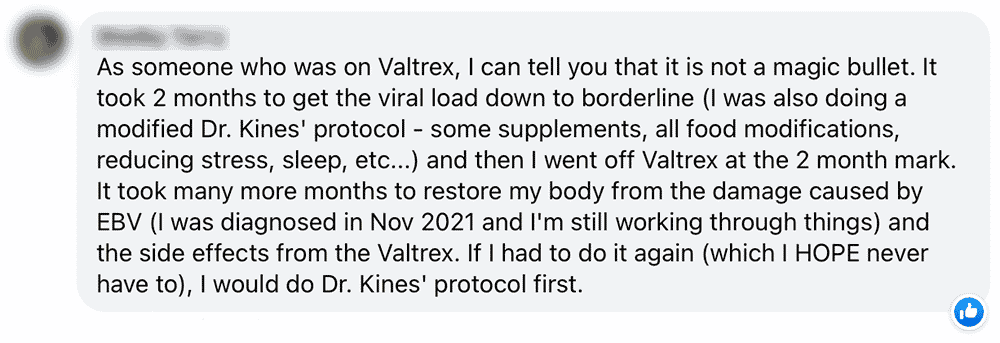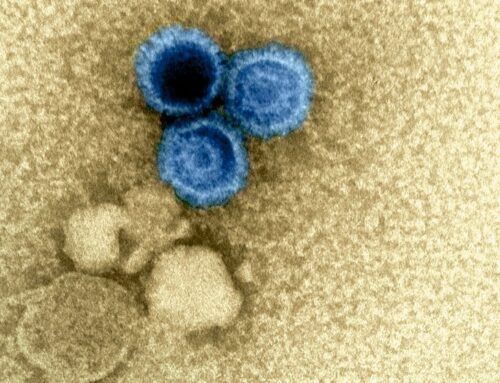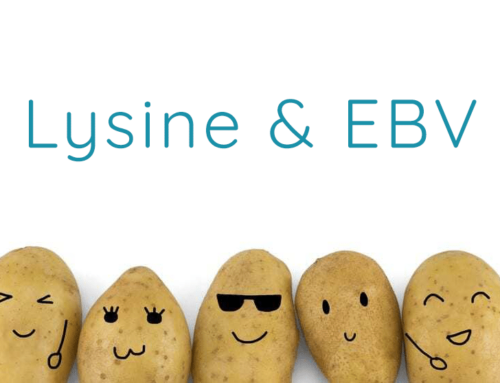“Uggggh….Why am I not getting better on Acyclovir?”
For years, I have been asked the same question again and again. People like you reach out to me with their last hope crushed. ‘’It WAS supposed to work.’’ But…
- You are still overwhelmingly exhausted
- Your brain fog still borders on cognitive decline
- And you still have mystery medical conditions, odd unexplained symptoms, and even autoimmune conditions…
You wonder, “is this as good as I’ll get?”
Because it didn’t work…
- You’re still unable to do your job
- You’re depressed about not having the energy to be a mom
- Worse yet, you’re barely dragging yourself from the bed to the kitchen.
Medications are supposed to help.
Each time you want to believe that this time it will work – The new protocol, the new doctor, the new pill.
…The antiviral medication
I love research. I love when doctors use it to benefit their patients. Most doctors are too busy to study the research though. If they did, they would tell you that the medication they recommend for your EBV may or may not work (and most likely will not have much of an effect on your EBV).
I have the advantage of being able to filter medical studies against real life, being I am in the EBV trenches every day in the real world with real people. Real-life situations, which in medical literature are called “anecdotal”, can put medical studies in perspective. I like to know what research says, and compare it to what our EBV community (doctors and patients with EBV) experience. This helps me see patterns.
A Necessary Disclosure
Before I go any further, let me make a full disclosure. I am not a prescribing medical doctor. I am a doctor of clinical nutrition. As such, I do not have the legal right to tell any patient to get off any medication. Nor is that the purpose of this article. So let’s proceed.
When Will Your Doctor Suggest the Antiviral Medication?
MONO: It is less likely for your doctor to recommend antiviral medication for your EBV if it is infectious mononucleosis (aka mono). Instead, what you will hear is: there is “nothing that can be done, so go home, sleep, rest, and you will be fine in a few weeks”
CAEBV: It is more likely that such medication will be recommended if you have chronic EBV (long term complications that resemble chronic fatigue syndrome, for example), the most common antiviral medication being Acyclovir.
Let me share with you that neither of the above recommendations sit well with me.
Let’s discuss the Mono scenario:
During mono, we can do much better (and much safer) if we do something rather than ‘’wait it out’’ with mono. Yes, many will fully recover after the 6-8 weeks as expected. But some WILL. NOT.
Mono can shift your baseline of what you knew to be your functionality. You just never fully recover. In some cases, mono goes chronic and develops into chronic active EBV (CAEBV). Medical literature calls it “chronic mononucleosis syndrome”, which resembles chronic fatigue syndrome.
You may feel chronic malaise with debilitating brain fog and a host of strange symptoms. Eventually, autoimmune conditions may start to present for no apparent reason too.
Let’s discuss the chronic EBV scenario:
With CAEBV, you are in a state of malaise, deep fatigue, brain fog, perhaps unexplained pain, and sometimes even an autoimmune condition like Lupus or Hashimoto’s Thyroiditis. While most doctors will not connect your autoimmune conditions or the myriad of your mystery illnesses to your EBV, they will most likely recommend Acyclovir.
Functional medical doctors may recommend a combination of the medication, botanicals, and supplements. Unless they have a smart EBV strategy, and know the virus well, this is a hit and miss approach. I know this because I talk to many caring and frustrated doctors (and of course so many people with EBV like you).
And so the question remains:
What to Realistically Expect from an Antiviral Medication for EBV

So, can Acyclovir work? The short answer is it can, but it rarely does.
First of all, what is Acyclovir?
Acyclovir is a synthetic analog of the purine nucleoside, guanosine, with potent antiviral activity against herpes simplex viruses type 1 and 2, varicella-zoster virus and other viruses of the herpesvirus family (especially in vitro studies, which are studies outside of human body). It is supposed to work by converting to its triphosphate form, acyclovir triphosphate (ACV-TP), which competitively inhibits viral DNA polymerase, incorporates into and terminates the growing viral DNA chain, and inactivates the viral DNA polymerase.
There are two issues I can see with the medication.
The therapeutic effectiveness is limited by the low oral bioavailability because of its limited aqueous solubility and low permeability (Nair et al., 2014). Acyclovir is slowly and poorly absorbed from the gastrointestinal tract and bioavailability decreases with increasing the dose.
The second challenge is the challenge most medications share: it tackles just a singular mechanism of action. This can be very powerful but also highly limiting. In the case of EBV, I find that addressing various mechanisms at the same time through proper dietary and supplement targets and including stress and sleep modulating tools provides for a much deeper penetration into the ability of the virus to replicate, lyse and maintain infection between reactivations. It is such a strong and insidious virus that it does require a comprehensive approach rather than a shotgun one-agent therapy.
There are three layers of information that each person with chronic or acute EBV should consider before getting high hopes for turning off the virus with medication:
- What does medical literature say?
- What do doctors I have trained in my methodology, who have used these medications for their patients, say?
- What do I consistently hear from our community of EBV Heroes, people with EBV – our students and those that simply reach out to me?
What Does Medical Literature Say?
It is established in medical literature that antiviral medications are not effective.
“While anecdotal reports suggested that antiviral therapy
(e.g., acyclovir, ganciclovir, vidarabine)
might be effective in some cases of CAEBV,
antiviral therapy is generally ineffective for this disease”
(Cohen, 2009).
At the same time,
“antiviral medications cause an excess of adverse effects
and carry a high cost, while natural antiviral agents
are safer and more broadly effective” (Vasquez, 2014).
I attest to this position, since we help people get their lives back from EBV in our programs without prescription medications.
Even when antiviral medications were administered along with immunosuppressive steroids for EBV,
“the effects were marginal.” (Pagano et al., 2018)
It appears that even though Acyclovir may be somewhat effective for acute Mono,
“neither acyclovir nor other drugs have any effec
on latent [EBV] infection.” (Pagano et al., 2018)
A Crash Course on Latency
in EBV Infection
We have just discussed the fact that antiviral medications are more likely recommended for chronic CAEBV than the acute mono. The study above is very clear that…
These medications have NO effect on latent EBV. It is unclear why the medications are still standard of care for CAEBV.
Latent means between reactivations. But if you think that nothing happens between EBV reactivations, you are very wrong. In fact, latency is what EBV relies on to keep thriving:
“Latent mechanisms are responsible for sustained infections:
EBV relies more on clonal replication of infected B cells for
maintenance of infection in the host cell”. (Odumade et al., 2011)
Let me point out that EBV can switch from lysing (think mono or a reactivation) to latency and back to lysing at any time, given the right environment (literature calls EBV a pleomorphic virus for that reason). In my clinical experience, these swings of reactivation and latency can happen as rarely as every few years or as often as menstrual cycles in women.
What is even more important for those with chronic active EBV is that Acyclovir
“does not prevent subsequent recurrences” (Gnann et al., 1983),
according to a study that goes back to almost 4 decades ago.
In effect, to summarize, the literature is telling us that we have a bandaid that can perhaps help a little in acute mono, but does nothing for the latent virus or to prevent reactivation.
What Functional Medical Doctors See in Their Practice
This is what medical research would consider anecdotal. I don’t have any clinical studies or statistics on this. I simply ask doctors that I train in my methodology or who work with EBV and talk to me about how their EBV patients are doing on antiviral medications.
The simple answer ranges from ‘’useless’’ to ‘’marginally effective’’, but not providing sustainable remission for their patients.
As this is anecdotal, I can’t say that this represents the majority of prescribing doctors. However, if these medications were effective, I would not have experienced such enormous interest in what I have to say among functional medicine practitioners.
Doctors are frustrated, looking for better solutions for their patients with EBV.
They feel that medications fail to treat EBV.
Dr. Loy is one of those doctors – an inspiring medical functional doctor that deeply cares about her patients – she was not able to help her patients despite access to prescription antiviral medications. Then she worked with me in our Practitioner Program to learn more to be better able to assist her patients.

What People with CAEBV Experience
My response to this point in our discussion is highly subjective and unintentionally biased because people who reach out to me are those that have not been able to get help after trying pretty much everything. Most have been very ill for a long time, even whole decades, disabled, depressed, highly anxious, and exhausted by trying to find a therapy to help them. Many have already tried antiviral medications.
Over the years, I have seen a few people that told me the medication did help and turned their health around. In the vast majority of cases though, the feedback is similar to doctors’ complaints. And that is consistent with medical literature: antiviral medications do not seem to be a match for chronic EBV. In some cases, the medication actually causes more symptoms. Here are the most common side effects: lightheadedness, headache, diarrhea, nausea, vomiting and abdominal pain.
What Should You Do?
First, always discuss this medication issue and any other medications with your doctor or a pharmacist.
A medication like Acyclovir may still be a part of a solution for your EBV, but as you can see, it is probably not wise to expect it to do the heavy lifting needed to put EBV into remission. The research is quite clear, and it is consistent with the feedback I get both from prescribing physicians and our EBV community.
Knowing all this now, you will be able to ask your doctor the right questions,
and then make the best decision for your situation.
I do know what works in my practice – I have developed an entire turn-key methodology as a nutritionist:
It works.
It’s sustainable.
It’s faster than you think, and it’s not hard.
It gives you your life back, long term.
Nothing makes me happier than seeing a person get their life back and stop suffering.
- You can be the mom you want to be for your children.
- You can have plenty of energy left after a productive day at work, in the kitchen, and in the garden!
- The fears or anxieties about your life and health can dissipate.
- Oh yes, you can dance too! And jog as well!

If you’ve tried everything, including the antiviral medications, and you are just sick and tired of being so sick and tired, here’s what I want you to do: act now.
If you have questions about your EBV and would like to connect with me directly, schedule a Clarity Session so that we can troubleshoot. Let’s move in the right direction fast, saving you energy, time, and resources.
If you are ready to heal from EBV, click here and join our community of EBV Heroes in our EBV Recovery Program, the last EBV Program you will need: www.ebvonlineprogram.com
P.S.
How much longer can you go on like this without fixing this? So many in our community overcame EBV and they were just like you. So let’s schedule a Clarity Session so that I can help you, and explain to you, how you can start to recover and truly heal.
People with EBV find it hard to believe, but it is true that you can heal from it. It is faster and easier than you think. Our system works if you use it right. You can really reclaim your life and prevent EBV reactivations in future by following very simple action steps consistently!
You can right start now: www.ebvonlineprogram.com
References:
Nair, A. B., Attimarad, M., Al-Dhubiab, B. E., Wadhwa, J., Harsha, S., & Ahmed, M. (2014). Enhanced oral bioavailability of acyclovir by inclusion complex using hydroxypropyl-beta-cyclodextrin. Drug Deliv, 21(7), 540-547.
Vasquez, A. (2014). Viral infections/dysbiosis and antiviral strategies (4th ed.): International College of Human Nutrition and Functional Medicine.







Leave A Comment